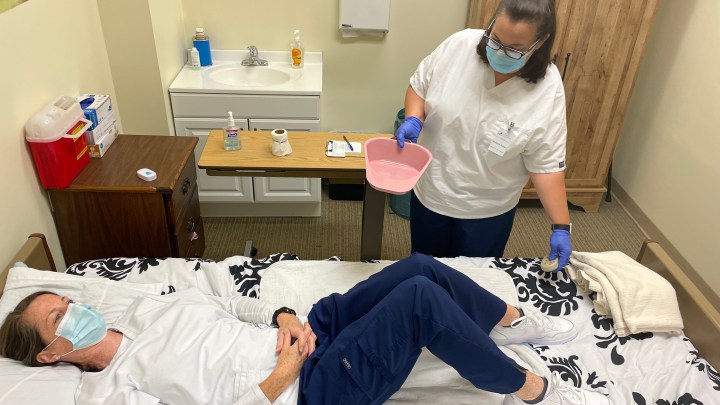
Could paid family caregivers alleviate the home health worker shortage?
Could paid family caregivers alleviate the home health worker shortage?

On her last day of class, Jessica Aviles stood outside the door of a clinical exam room.
Aviles, who lives in New Hampshire, was about to perform a mock examination of a patient. She took a deep breath and got into character. She knocked on the door, entered and cheerily introduced herself. She set up a bedpan for the patient, took her weight and carefully moved the patient from her back to her side.
Aviles was training to be a licensed nursing assistant, or LNA, and practicing the skills she learned as preparation for her final test.
But unlike her classmates, Aviles won’t be working in a nursing home or other facility. Her goal is to get hired by a home care agency to help her 7-year-old son, Gabe.
Gabe has Duchenne muscular dystrophy. The condition will cause all his muscles to eventually break down, even his lungs and heart. Often, people with the disease don’t live past their 20s.
With the ongoing shortage of health care workers, families across the country are struggling to access the home care their loved ones need. For people who care for relatives with chronic conditions, the problem is particularly acute.
But there are ways that Medicaid pays family members to provide in-home care, although the programs vary from state to state.
Brenda Rees works for LNA Health Careers, the school where Aviles trained. Rees said she wishes more people in New Hampshire realized “they could bring in an extra income and they could still stay at home and care for their loved one.”
After graduating from the training program, Aviles was hired by a home care agency. She’s earning $13 an hour and working 50 hours a week as Gabe’s LNA, care he qualifies for through New Hampshire’s Medicaid program.
“Being able to meet more of his needs on a more professional level, I feel like it’s going to make me a better mom to him,” Aviles said.
Medicaid payment for family caregivers varies widely around the country, and parents don’t always qualify.
“The devil can really be in the details because states have so many different ways of approaching this,” said Kitty Purington, a senior program director with the National Academy for State Health Policy.
For Aviles, the LNA training will also help her as Gabe’s Duchenne’s disease worsens.
“Once he’s older and he can’t use his hands, he might want somebody to shave his face. Then I’ll be able to go, ‘I was trained for this, I know how to do this,’” she said.
With COVID-19, some states have provided more flexibility to pay family caregivers through Medicaid, but whether that flexibility will continue when the pandemic is over remains to be seen.
There’s a lot happening in the world. Through it all, Marketplace is here for you.
You rely on Marketplace to break down the world’s events and tell you how it affects you in a fact-based, approachable way. We rely on your financial support to keep making that possible.
Your donation today powers the independent journalism that you rely on. For just $5/month, you can help sustain Marketplace so we can keep reporting on the things that matter to you.











